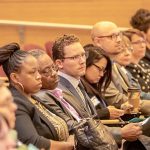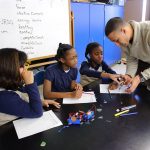Doug Glanville is a former Major League Baseball player, and has been an analyst for a variety of networks and publications. He’s the author of a book, “The Game From Where I Stand” and teaches at UConn. He’s also a member of the Connecticut Police Officer Standards and Training Council, and has been active in police reform efforts in the state after a widely-publicized incident where he was racially profiled in his own driveway.
This summer marks one year since the Neag School’s University of Connecticut Administrator Preparation Program (UCAPP) began implementing changes as part of a nationwide effort known as the University Principal Preparation Initiative (UPPI). In 2016, UConn was one of seven universities selected to join this initiative, funded by New York City-based Wallace Foundation, aimed at improving training for aspiring administrators.
Congratulations to our Neag School alumni, faculty, staff, and students on their continued accomplishments inside and outside the classroom.
“Teachers and parents often hear about intervention programs through advertising and promotion,” says Devin Kearns, co-author of the article and an associate professor of special education at the Neag School of Education. “However, it can be difficult to judge whether these programs are supported by reliable research – especially for students with dyslexia.”
“Folks are going to be in really different places in terms of their own schedules and situations,” Sarah Woulfin says. “In the spring, a professor from another university posted an adapted syllabus for the COVID era, and one of the points was to have a class where we can get together for ‘intellectual nourishment,’ in his phrasing. I adapted that into my class as pillars for our work together. We’re here to learn, but know that there is a lot of other stuff going on in the world and our lives. So let’s be humane with each other, foster connection, and learn together during our time online.”
The Education Project is excited to welcome two keynote speakers Basiyr Rodney, Ed.D. and Glenn Mitoma, Ph.D. who will both be further engaging with The Education Project’s main focus; educational disparities, equal access to technology, and social justice in education at our official launch event.
“I think the results of our initial study provide confirmation — from a research standpoint — regarding the many news reports that we have seen about the increased expectation, without additional resources, faced by caregivers of children with disabilities,” says Sandra Chafouleas, co-director of the Collaboratory on School and Child Health and a UConn Board of Trustees Distinguished Professor. “The burden is real, and taking not only a toll on their children but caregiver well-being.”
The University of Connecticut has been awarded a $5 million grant from the U.S. Department of Education’s Institute of Education Sciences to examine and strengthen gifted education opportunities for underserved populations through four studies. UConn’s National Center for Research on Gifted Education (NCRGE) will investigate strategies for recognizing and responding to untapped talent and explore the outcomes of gifted education services.
While some families are nervous about sending their children back to school, other parents are working to find ways to keep a teacher’s influence in their lives – even when they are learning remotely.
The University of Connecticut has been awarded a $5 million grant from the U.S. Department of Education’s Institute of Education Sciences to examine and strengthen gifted education opportunities for underserved populations through four studies. UConn’s National Center for Research on Gifted Education (NCRGE) will investigate strategies for recognizing and responding to untapped talent and explore the outcomes of gifted education services.



